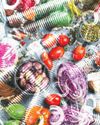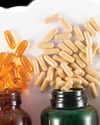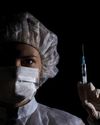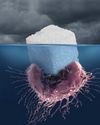
Cancer cells are different. Instead of feeding on oxygen, as healthy cells do, they thrive on glucose-the sugars in the blood that come from carbohydrates and this also produces lactate, an acid that allows the cancer to spread.
It's not news. The process was first observed by German physicist Otto Warburg in 1924 and was then almost completely ignored by the cancer industry, other than by a few maverick outliers who advocated a zero-carb keto diet as part of cancer therapy.
With the discovery of the DNA structure in 1953, cancer theory took a different route and focused on genetic mutations. It was a false trail, and today researchers acknowledge that energy metabolism is the key to understanding cancer's genesis and spread. It's estimated that 80 percent of cancers are the result of the "Warburg effect, as Warburg's discoveries were labeled.
The one new insight into Warburg's work is that it is the mitochondriathe powerhouses of cells that convert sugar (carbs), fats and proteins into energy that are damaged and so become over-reliant on glucose for their rapid growth. Oncologists recognize the phenomenon and routinely use PET (positron emission tomography) scans to seek out areas of the body that are consuming excessive amounts of glucose and therefore to detect cancer.
If the Warburg effect is right, there are other clues in the observation that suggest new ways of treating cancer and, more importantly, preventing it. A team of Israeli researchers has done just that by discovering that aerobic exercise reduces the risk of metastatic cancerthe cancers that spread and are almost always lethal-by 72 percent."
Feed me sugar
هذه القصة مأخوذة من طبعة April/May 2023 من What Doctors Don't Tell You Australia/NZ.
ابدأ النسخة التجريبية المجانية من Magzter GOLD لمدة 7 أيام للوصول إلى آلاف القصص المتميزة المنسقة وأكثر من 9,000 مجلة وصحيفة.
بالفعل مشترك ? تسجيل الدخول
هذه القصة مأخوذة من طبعة April/May 2023 من What Doctors Don't Tell You Australia/NZ.
ابدأ النسخة التجريبية المجانية من Magzter GOLD لمدة 7 أيام للوصول إلى آلاف القصص المتميزة المنسقة وأكثر من 9,000 مجلة وصحيفة.
بالفعل مشترك? تسجيل الدخول

Metalhead
Could toxic heavy metals be making you ill? Here's how to spot the signs and symptoms, says Dr Leigh Erin Connealy, and your action plan for effective detox

Good bones
There's a lot of fearmongering when it comes to the risk of fractures in older women, says Marcelle Pick. Here's what you need to know and how to look after your bones naturally

Supplements in the spotlight
Confused about supplements? Dr Jenny Goodman has the lowdown on why we need them, how to choose a top-quality product and the ingredients to avoid

Essentially balanced
These essential oils can help you soothe stress, balance your hormones and feel like your best self again

An integrative approach to breast cancer
Blending the best of integrative medicine with the best of conventional medicine gives the greatest chance of healing breast cancer, says Dr Leigh Erin Connealy

THE NEEDLE'S EDGE
An intriguing new theory says it's not what's in the jabs but how the needles are inserted that explains the rampant and varied Covid vaccine damage. Celeste McGovern investigates the Bolus Theory

How sugar causes cancer
Amajor breakthrough in cancer research has discovered that sugar-usually from fast food-switches off our cancer-fighting genes

The illusion of the magician
Howrelative risk makes a drug seem effective when it’s not

Of pesticides and PMS
Detoxing from a hormone-disrupting herbicide, along with getting the right nutrition, was the answer to a patient’s debilitating PMS, says Dr Jenny Goodman

Not just a phase
Is your workout working against your hormones? Debra Atkinson explains why and how to exercise with your hormonal cycle for the best results